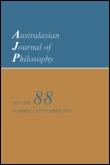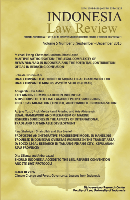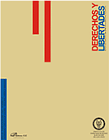
LAW AND PHILOSOPHY
Scope & Guideline
Illuminating the Foundations of Justice through Philosophy
Introduction
Aims and Scopes
- Legal Theory and Philosophy:
The journal focuses on theoretical frameworks that underpin legal systems, exploring philosophical questions related to justice, responsibility, and the nature of law itself. - Criminal Law and Ethics:
A significant area of research involves the ethical considerations surrounding criminal law, including punishment, culpability, and the moral implications of legal decisions. - Social Justice and Legal Practice:
The journal addresses issues of social justice, examining how laws affect marginalized communities and the ethical responsibilities of legal practitioners. - Interdisciplinary Approaches:
The journal encourages interdisciplinary work that brings insights from moral philosophy, political theory, and social sciences to bear on legal issues. - Impact of Law on Society:
Research often investigates the broader societal impacts of legal frameworks, including the effects of laws on individual behavior and societal norms.
Trending and Emerging
- Neuroscience and Legal Responsibility:
There is a growing interest in how neuroscience intersects with legal concepts of responsibility and culpability, suggesting a trend towards understanding human behavior through a scientific lens. - Ethics of Artificial Intelligence:
As technology advances, papers discussing the ethical implications of AI in legal contexts are increasingly prevalent, highlighting the need for legal frameworks to adapt to new challenges. - Social Justice and Criminal Law Reform:
Recent themes emphasize the need for reform in the criminal justice system, focusing on equity, fairness, and the impact of systemic biases on marginalized communities. - Consent and Legal Boundaries:
The exploration of consent—particularly in sexual and medical contexts—has emerged as a critical theme, reflecting broader societal debates about autonomy and rights. - Political Corruption and Institutional Ethics:
A rising focus on the ethics of political institutions and the implications of corruption suggests a renewed interest in accountability and governance within legal discourse.
Declining or Waning
- Traditional Retributive Justice:
There has been a noticeable decrease in discussions centered solely on retributive justice, with more emphasis on restorative and rehabilitative approaches to punishment. - Legal Formalism:
The analysis of law through a strictly formalistic lens appears to be declining, as scholars increasingly recognize the importance of context and moral reasoning in legal interpretation. - Historical Legal Analysis:
While historical perspectives on law remain relevant, there is a growing trend towards contemporary issues, leading to fewer papers that focus exclusively on historical legal analysis. - Strict Legal Positivism:
The strict application of legal positivism as a dominant lens for understanding law is waning, as more scholars advocate for integrating moral and ethical considerations into legal theory. - Focus on Procedural Justice:
Although still important, the emphasis on procedural justice has diminished in favor of discussions surrounding substantive justice and the equitable application of laws.
Similar Journals

Grotiana
Unveiling Historical Narratives in LawGrotiana, a prestigious journal published by BRILL, stands as a vital resource for scholars and professionals engaged in the fields of History and Law. With its ISSN 0167-3831 and E-ISSN 1876-0759, this journal has been a beacon of academic inquiry since its inception, covering a diverse array of topics with an emphasis on legal history and historical jurisprudence. Grotiana holds a commendable impact within the academic community, reflected in its 2023 Scopus ranks indicating a 91st percentile in History and a 67th percentile in Law, underscoring its significance in interdisciplinary studies. Although not an open-access journal, it offers robust access options for institutions and individuals alike, facilitating research and knowledge dissemination. Scholars can benefit from its rich historical insights and rigorous legal analysis, contributing to the ongoing dialogue in these fields. With publishing cycles spanning from 1980 to 2024, Grotiana continues to uphold its commitment to excellence, making it a pivotal player for researchers, students, and professionals pursuing a deeper understanding of historical and legal frameworks.

JOURNAL OF VALUE INQUIRY
Navigating the Philosophical Landscape of Law and EthicsJOURNAL OF VALUE INQUIRY, published by Springer, is a distinguished academic journal that has been a vital platform for the advancement of philosophical discourse since its inception in 1967. With an ISSN of 0022-5363 and an E-ISSN of 1573-0492, this journal focuses on the intricate intersection of philosophy, law, and social sciences, achieving impressive rankings in various categories with a Q1 designation in Philosophy and noteworthy placements in Law and Social Sciences as of 2023. The journal operates from Dordrecht, Netherlands, and serves as a vital resource for researchers, scholars, and students interested in ethical theories, the foundations of values, and their implications across diverse contexts. Though it is not an open-access journal, it maintains rigorous academic standards, embodying a commitment to contribute to the ongoing discussions in the philosophy of values. With its convergence extending to the horizon of 2024, JOURNAL OF VALUE INQUIRY continues to shape critical thought and foster scholarly dialogue within the realms of humanities and social sciences.

Res Publica-A Journal of Moral Legal and Political Philosophy
Advancing Thought in Moral and Political PhilosophyRes Publica: A Journal of Moral Legal and Political Philosophy, published by Springer, stands as a leading forum for scholarly discourse in the intersecting realms of law, philosophy, and ethics. With its ISSN 1356-4765 and E-ISSN 1572-8692, this esteemed journal, located in Dordrecht, Netherlands, has been contributing significantly to the academic landscape since 1994 and will continue to do so until 2024. Recognized with a Q1 ranking in both the Law and Philosophy categories for 2023, Res Publica is a vital resource for researchers, professionals, and students aiming to explore complex moral and political frameworks. The journal publishes rigorous peer-reviewed articles that address contemporary issues while adhering to the highest academic standards, thus reinforcing its impact factor and relevance in a fast-evolving intellectual environment. While it does not offer open access options, its robust reputation and credible content ensure that valuable insights are accessible to those committed to understanding the theoretical underpinnings of legal and political practices.

AUSTRALASIAN JOURNAL OF PHILOSOPHY
Cultivating Innovative Ideas for a Modern AgeAustralasian Journal of Philosophy, published by Routledge Journals, Taylor & Francis Ltd, serves as a premier platform for scholarly discourse in the field of Philosophy. With its origins dating back to 1947, this esteemed journal maintains a rich tradition of fostering high-quality, peer-reviewed research and is recognized for its significant contribution to the philosophy community. Holding a distinguished Q1 ranking in the field for 2023 and standing at #75 out of 806 in the Scopus Arts and Humanities ranking, it occupies a vital niche in advancing philosophical knowledge and inquiry. Although the journal is not open access, it periodically offers articles that contribute to the dissemination of philosophical thought, making it a valuable resource for researchers, professionals, and students alike. The AUSTRALASIAN JOURNAL OF PHILOSOPHY continues to inspire and challenge thinkers worldwide as it presents critical analyses, innovative ideas, and rigorous arguments, ensuring its relevance and importance in contemporary philosophical discussions.

Indonesia Law Review
Fostering Scholarly Discourse on Legal ChallengesIndonesia Law Review is a premier open-access academic journal dedicated to advancing knowledge in the fields of law and social sciences, with particular emphasis on the Indonesian legal landscape. Established by the Indonesian Law Review, this journal has made significant strides since becoming open access in 2014, ensuring that research is freely available to a global audience. Based in Depok, West Java, the journal seeks to foster scholarly discourse on legal issues pertinent to Indonesia, while also contributing to the broader field of education and social sciences. With its current Scopus rankings placing it within the top tiers of law and social sciences, including a Q3 categorization in law and a Q4 classification in education and miscellaneous social sciences, the **Indonesia Law Review** serves as a vital platform for researchers, professionals, and students to disseminate their findings and engage with contemporary legal dilemmas. The journal is committed to providing a robust forum for innovative legal scholarship and is an essential resource for anyone seeking to understand the complexities of law in Indonesia and beyond.

Derechos y Libertades
Advancing human rights discourse for a just society.Derechos y Libertades is a well-regarded academic journal published by the Universidad Carlos III de Madrid, Instituto de Derecho y Economía, focusing on the fundamental areas of human rights and civil liberties. Since its inception, this journal has aimed to advance scholarly discourse by providing a platform for high-quality research, critical analysis, and innovative perspectives in the fields of law and economics. Transitioning to Open Access in 2021, it now reaches a broader audience, allowing researchers, professionals, and students unrestricted access to its articles, thus promoting the dissemination of knowledge and fostering collaboration within the academic community. With its commitment to excellence and relevance, Derechos y Libertades serves as an essential resource for those engaged in the study and advocacy of human rights, striving to influence policy-making and societal change.

Doxa-Cuadernos de Filosofia y Derecho
Advancing Knowledge at the Intersection of Philosophy and LawDoxa-Cuadernos de Filosofia y Derecho, an esteemed journal published by Universidad de Alicante, serves as a vital platform for scholarly discourse in the fields of philosophy and law. Established with the intention of fostering an interdisciplinary understanding, the journal is indexed with an impressive Q1 ranking in Philosophy and a Q2 ranking in Law for 2023. With its Open Access policy implemented since 2016, Doxa ensures that cutting-edge research is freely accessible, promoting wider dissemination of ideas and encouraging academic collaboration. Housed in the picturesque city of Alicante, Spain, Doxa celebrates a converged publishing timeline from 2019 to 2023, reflecting its commitment to contemporary issues and dialogues within both disciplines. As a vital resource for researchers, professionals, and students, this journal invites contributions that push the boundaries of philosophical inquiry and legal scholarship.

Anuario de Filosofia del Derecho
Unraveling the Intricacies of Justice and LawAnuario de Filosofia del Derecho is a prestigious journal dedicated to the exploration and advancement of legal philosophy, published by the Ministerio Justicia, Centro Publicaciones in Madrid, Spain. With its ISSN 0518-0872, this journal serves as a critical platform for scholars, practitioners, and students interested in the intricate relationship between law and philosophy. The journal prioritizes original research articles, review papers, and thought-provoking essays that delve into contemporary issues and foundational theories within legal frameworks. Although currently not an open-access publication, it plays a vital role in stimulating discourse in legal and philosophical studies, guiding readers through complex theoretical landscapes while fostering a deeper understanding of justice and legal systems. By contributing to the discourse on legal thought, Anuario de Filosofia del Derecho stands out as an essential resource for anyone seeking to advance their knowledge in this field.

Sophia
Cultivating Knowledge at the Intersection of Thought and TraditionSophia, a prestigious journal published by Springer, is a leading platform for the advancement of knowledge in the fields of Philosophy and Religious Studies. Established in 1962, this open-access journal has embraced a global perspective and invites scholarly contributions that explore complex philosophical questions and the intricacies of religious thought. With an impact factor that reflects its significance, Sophia ranks in the top quartiles of its categories on Scopus, specifically Q2 in Philosophy and Q1 in Religious Studies, showcasing its influence and reach within the academic community. With convenient open access options available since 2009, the journal ensures that research disseminates freely, promoting engagement among researchers, professionals, and students alike. Located in the Netherlands and connected to a reputable international network, Sophia remains committed to fostering intellectual dialogue and enriching the discourse surrounding philosophical and religious issues worldwide.

Criminal Law and Philosophy
Innovative Perspectives on Law and Moral TheoryCriminal Law and Philosophy, published by SPRINGER in the Netherlands, is an esteemed peer-reviewed journal that explores the intricate intersections of law and philosophical inquiry. With an ISSN of 1871-9791 and an E-ISSN of 1871-9805, this journal is a vital resource for researchers, professionals, and students interested in the ethical, theoretical, and practical dimensions of criminal law. Renowned for its rigorous contributions and innovative perspectives, the journal has achieved a commendable Q2 ranking in both the fields of Law and Philosophy as of 2023, and demonstrates a strong commitment to fostering critical dialogue in these disciplines. With a Scopus rank placing it in the top 25% of Philosophy journals and above the 56th percentile in Law, Criminal Law and Philosophy continues to expand its influence and accessibility within the academic community and beyond, making it an indispensable platform for advancing scholarship at the confluence of law and moral theory.